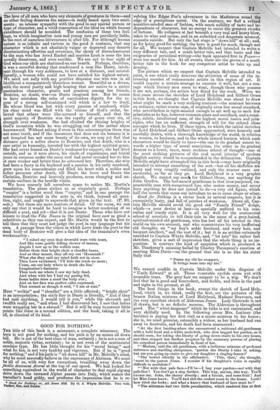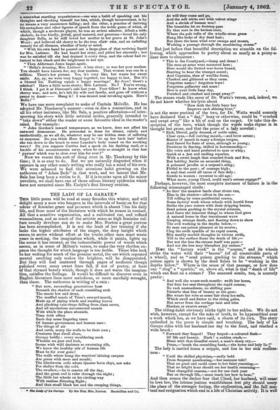GOOD FOR NOTHING.*
Tim title of this book is a misnomer, a complete misnomer. The hero is not good for nothing, and his path is by ne means all down hill. He is not of the best class of man, certainly; he is not a man of noble, majestic virtue, certainly; he is not even of the sentimental excekior type. He has little thought for his " moral being," and what he has, is not very healthy and vigorous. But if he is "good for nothing," and if his path is " all down hill" in Mr. Melville's mind, why he must assuredly believe in the supremacy of Ahriman. We must be all of us, with very few exceptions, trundling away down the fad& descensus Averni at the top of our speed. We had looked for something equivalent in the world of character to that rapid zig-zag drive down the terraced Alpine passes into Italy, which makes the traveller's head giddy, and produces the impression that he is re- • Good for Nothing; or, Ali Down Holt By 0. J. Whyte Melville. Two rob. Parker, Son, and Bourn. volving like Edgar Poe's adventurer in the Maelstrom round the edge of a precipitous spiral. On the contrary, we find a refined sensitive-minded man of fashion, with much nobility of taste and in- dependence of character, but no energy to resist the greatest shocks of fortune. He collapses at last beneath a very real and heavy blow, takes to wine and opium, and in an enfeebled and desperate moment, commits suicide. But only the last stage is " down hill" at all; and, as for being good for nothing, the hero is good for much, though not for all.' We suspect that Captain Melville had intended to write a very different tale, and a much better tale, and that haste and the exigencies of periodical writing—the beok appeared first in Fraser— were too much for him. At all events, there are the germs of a mach better tale in the book for any competent artist to take up and develop. The picture which we suspect that Captain Melville intended to paint, is one which really deserves the attention of some of the in- creasing number of consummate artists in this region of art. It would require a certain courage to execute it well, but not a cou- rage which literary men seem to want, though those who possess it are not, perhaps, the artists best fitted for the work. When we first came across the sketches of Lord Holyhead and Gilbert Orme in this book, we thought that Captain Melville was about to draw what might be made a very striking contrast—the contrast between an ordinary, rather coarse man, of originally even low moral standard, who nevertheless is right-minded enough to act well up to such few principles as he has, however common-place and unrefined, and a sensi- tive, subtle, intellectual man, of the highest moral tastes and prin- ciples, who has no sufficient strength of will for the refined ideas amongst which he lives. If these types, to which the initial sketches of Lord Holyhead and Gilbert Orme approached, were honestly and carefully drawn, with a thorough knowledge of the world, in relation to women, to business, and to the whole inward horizon which such characters would be likely to have—the one in its gradual ascent to- wards a higher type of moral conviction, the other in its gradual descent to a lower, laxer, more reckless school of thought—one of the most striking pictures of the real moral interior of modern English society would be comprehended in the delineation. Captain. Melville might have attempted this in this book—may have originally intended to attempt something of the sort—but all his sketches are hasty and very roughly outlined, and only the coarser ones are successful, so far as they go. Lord Holyhead is a very graphic sketch. We cannot say muck for Gilbert Orme, nor anything for John Gordon. The last-named gentleman is that iron-purposed, im- penetrable man with compressed lips, who makes money, and never does anything he does not intend to do—a very old figure, which half the novels that come out introduce to us in some shape or other. Good for Nothing is a clever book in several respects, but it is excessively hasty, and full of patches of weakness. Above all, Cap- tain Melville should avoid the good old "Family Friend" dodge, which—a poor device at best—is specially unfitted to his mas- culine and sturdy style. It is all very well for the sentimental school of novelists to tell their tale in the name of a grey-haired, spiritual-minded old gentleman, who has lost all his interest in this world on his own account, and who concentrates his very ineffectual old thoughts on "my boy's noble forehead, and wavy hair, and buoyant intellect," and the rest of it ; but it is an artifice extremely unsuited to Captain Whyte Melville, and, "let into" his rather fast sketches, gives a sort of impression that the whole thing is an im- position. It conveys the kind of suspicion which is produced in Mr. Thackeray's amusing ballad by Charley Thompson's emotion at meeting Eliza Davis—on the ground that she is so like his sister Sally that
" Damn my old lee scuppers, It brings tears into my hie."
We cannot confide in Captain Melville under this disguise of "-Uncle Edward" at all. Those venerable eyelids seem wet with crocodile tears. The grey hair we suspect to be a wig. We don't feel that he is good and benevolent, and feeble, and lives in the past and sighs in the present, at all. The best things in the book, except the sketch of Lord Holy- head, which is, we think, really the best, are the pictures of the brazen Italian mistress of Lord Holyhead, Madame Bravoura, and the very excellent sketch of Alderman Jones. Lady Gertrude is not ill drawn, but is no definite success. The Alderman is throughout good. The " whist-language" which he talks is not caricatured, and very skilfully used. In the following scene Mrs. Latimer (the heroine) is paying her first visit as a music mistress to his house; she is, we must premise, ostensibly a widow, as her husband had run away to Australia, and his death had been announced :
"At the first landing-place she encountered a rubicund old gentleman with a bald head and a white neckcloth, who first begged her pardon, as it should seem, for taking the liberty of going down-stairs in his own house, and then stopped her further progress by the summary process of placing his corpulent person immediately in front of her.
" Madam,' said the old gentleman, with a ludicrous mixture of profound deference and startling abruptness, pardon the liberty I take in asking, but are you going up-stairs to give my daughter a singing-lesson ?'
"She bowed silently in the affirmative. 'This, then,' she thought, must be the parent Jones. I wonder if his daughter's voice is equally difficult to modulate ?'
" Not with that pale face—I'll be—I beg your pardon—not with that pale face ! You don't go a step further. This way, ma'am, this way. You'll excuse me. John, the sherry directly ; and a biscuit, and some fruit ! And let Miss Jones know. You'll find this the coolest room in the house. Lord how tired she looks ; and what a knave that husband of hers must be I' "The alderman had two little peculiarities, which rendered him at first
a somewhat startling acquaintance—one was a habit of speaking out his thoughts and checking himself too late, which, though inconvenient, is by no means a very uncommon failing ; and the other, a practice of deriving his metaphors and other figures of speech from the noble game of whist, of which, though a moderate player, he was an ardent admirer. Albeit a trifle choleric, he was kindly, jovial, good-natured, and generous—loved his only daughter Bella, as he still loved her mother in her grave at St. John's Wood ; and believed old sherry to be the true elixir vita, and an unfailing remedy for all diseases, whether of body or mind.
"With his own hand he poured out a large glass of that reviving liquid for Mrs. Latimer. He had heard her story, and pitied her sincerely; nor was he satisfied till she had dreined it every drop, and the colour had re- turned to her cheek and the brightness to her eye.
"Then Alderman Jones began again.
" Bella's dressing, Mrs. Latimer. A late riser; so was her poor mother. You should have known her, my dear madam. That woman was one in a million. There's her picture. Yes, it's very like, but wants her sweet smile. Ay, ay, we were very happy together, too happy to last. But it's a blessed lot. Nothing equals a happy marriage ! By Jove ! there's a misdeal ! Have a little more sherry, Mrs. Latimer. No ? You're wrong, I think. I got it at Discount's sale last year. Poor fellow ! he knew what sherry was; and now, he's left his wife and family, and gone off without a penny to Austx— Hang it ! I was deuced near revoking again. Here's Bella!'"
We have one more complaint to make of Captain Melville. He has adopted Mr. Thackeray's manner—even is him a mannerism, and in all his other imitators, like Mr. Sala, a positive affectation—of inter- spersing his story with little satirical asides, generally intended to "take down" either the reader or some favourite ideal in the reader's mind. For example :
" John Gordon's inward temperature, as we know, does not affect his outward demeanour. He proceeded to dress for dinner, calmly and methodically, as we all do, whatever may be our hidden state of suffering or suspense. Do you think Hero forgot to do up her back hair' before she ran down to the beach to meet Leander's body tossed on the mocking wave ? Do you suppose Cardin had a speck on his flashing mail, or a buckle of his accoutrements awry, when he rode so straight at that last yawner' which was to close over him for ever ?"
Now we resent this sort of thing even in Mr. Thackeray by this time; it is so easy to do. But we are naturally disgusted when it appears in any other man's writing who really has a mind of his own. We were ashamed to find this atrocious habit growing on the authoress of "Adam Bede" in that work, and we lament that Mr. Sala has long been a victim to it. If it is to seize upon all the minor novelists, we shall have one of those odious literary epidemics which have not occurred since Mr. Carlyle's first literary ovation.



































 Previous page
Previous page